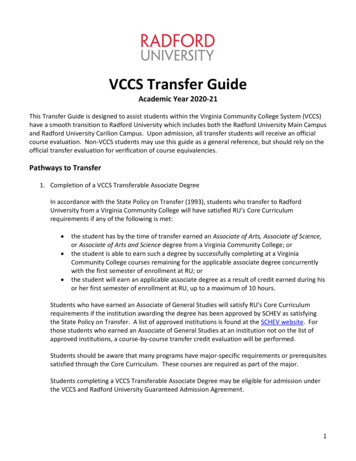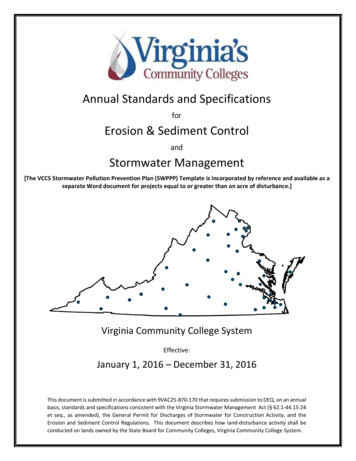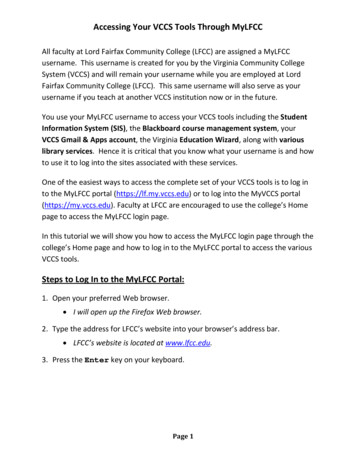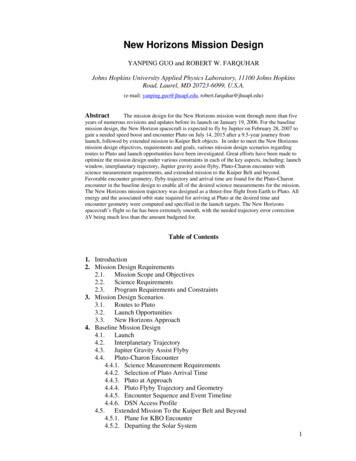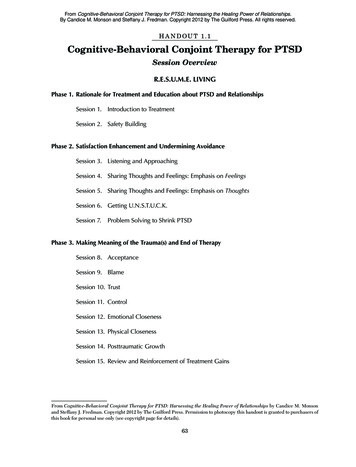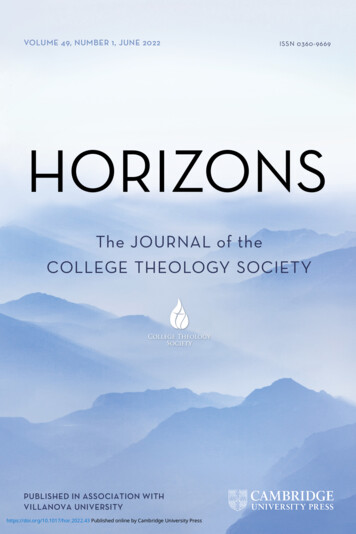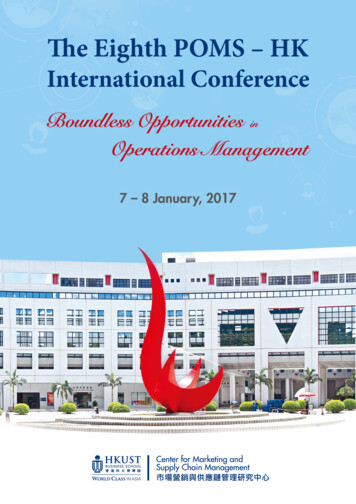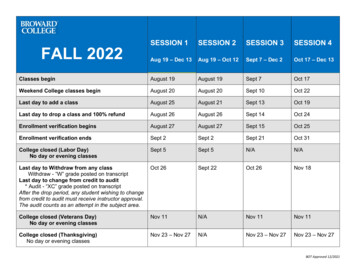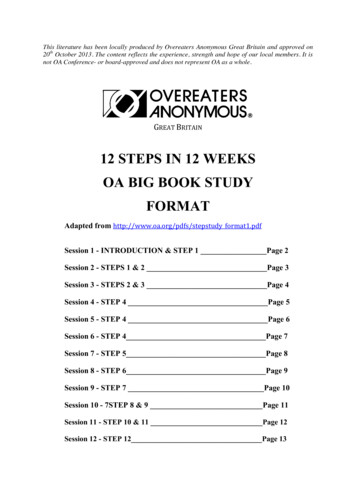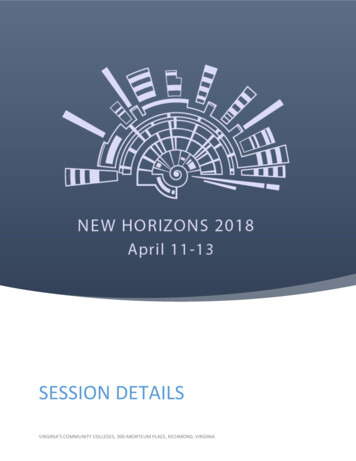
Transcription
SESSION DETAILSVIRGINIA’S COMMUNITY COLLEGES, 300 ABORTEUM PLACE, RICHMOND, VIRGINIA
Session One2:00 - 2:45 p.m.Shenandoah AUpper LevelRecommended for:Faculty, Deans/VPs/Presidents,Student Services, Classified Staff,AdjunctsInterested in:Integrated Student SupportAudience level:BeginnerAdvising as a Pathways CollegeAlison Thimblin, Northern VirginiaKeri Bowman, Northern VirginiaWith the implementation of VIP-PASS, Northern Virginia Community College (NOVA) iscommitted to transformative changes to improve student success. Along with informedpathways and technology implementation, NOVA will provide a consistent model ofadvising to students. Students will be served where they come, according to their levelof need.As a very large, multi-campus community college, NOVA strives to deliver high quality,consistent service to students in support of their success. The new advising model isbased on collective decision making, consistency, and accountability. Students haveimproved self-service resources, are provided with more direction through informedpathways, have the opportunity for “on demand” advising (virtually and in person), andare proactively “nudged” to complete milestones to stay on course to completion.Students with “high-need advising issues” are identified and advisors proactivelyintervene to help the student stay on track. Students are served by a variety of advisingstaff, including professional and faculty advisors, who serve as general and programspecific advisors. Advising roles are clearly defined through consistent CAS-basedcompetencies and expectations. The use of informed pathways and technology assistsboth students and advisors to help students reach their academic goals.Session One2:00 - 2:45 p.m.HR FAQ’s: Teaching Faculty Ask, We Share the Answers―Pay, Benefits,Retirement, Policies, and MoreShenandoah BUpper LevelChristopher Lee, Virginia’s Community CollegesJennifer Pittman, Virginia WesternRecommended for:AllInterested in:Effective Business ProcessesAudience level:IntermediateSession One - Two2:00 - 3:45 p.m.Pocahontas A - Computer LabUpper LevelRecommended for:Faculty, AdjunctsInterested in:Innovative Teaching and LearningThis session will address questions about personnel policies, practices, and protocolsthat will help faculty make the most of their employment experience, thereby enhancingtheir ability to serve students. Fostering our shared understanding and appreciation ofpay practices, promotions, benefits, and related matters helps assist performanceimprovement and career management.This session is back by popular demand. It is an interactive Question and Answer sessionthat will provide faculty with the unique opportunity of asking the most daunting ofquestions to a panel of HR experts. Learn answers to everyday and long-termemployment challenges and opportunities. College leadership, faculty, and the HRcommunity have recognized that a correct answer to an employment-related issue canmake a world of difference. Come learn about as well as take advantage of the breadthof HR services, benefits, and perquisites that the VCCS and state offer. A resource toolfor attendees to reference as needed in the future will also be provided. This dynamicexchange will encourage attendees to listen, inquire, and learn together within the spiritof this conference.Combating Misinformation: Arm Your Students for BattleTamara Whyte, Piedmont VirginiaCrystal Newell, Piedmont VirginiaLaura Skinner, Piedmont VirginiaThis workshop is a hands-on professional development opportunity where attendees willcreate a ready-to-deploy information literacy assignment for their classes. They will workwith peers to create discipline-specific assignments, intentionally designed to teach theirstudents the skills they need to evaluate credibility in everything from media messagesto scientific studies.VCCS NEW HORIZONS 2018 SESSION DETAILS WEDNESDAY, APRIL 11, 2018p. 1
Audience level:Beginner“Young people’s ability to reason about the information on the Internet can be summedup in one word: bleak.” - Stanford History Education Group, Evaluating Information: TheCornerstone of Civic Online ReasoningWe must counteract this trend, and to do so we must ensure our students learn how toevaluate information in ALL subject areas.Come to a hands-on professional development workshop and walk away with a readyto-deploy assignment. Work with peers to create discipline-specific assignments,intentionally designed to teach your students the skills they need to evaluate credibilityin everything from media messages to scientific studies.Session One2:00 - 2:45 p.m.The Effect of Social Media Usage on Course Achievement and BehaviorPocahontas BUpper LevelThis research looked at the potential benefit to utilizing a popular app with students toenhance positive course behavior.Recommended for:Faculty, AdjunctsThis session will convey the results of recent research that investigated creativeinstructional practice to engage students deeper in student-teacher interaction as wellas student-student interaction through the use of the social media application“whatsapp” as a group class management tool. Researchers studied the effects of thetool on student achievement and their behavior in class. All the students and the teacherwere included in the group. Students were able to talk to each other and the teacher.The teacher was able to interact with the students within their choice of media. Studentsused the whatsapp group to help each other keep up with assignments and share notesand to solicit confirmations from the instructor. The instructor used the groupapplication to remind students of upcoming deadlines for tests and assignments. Resultsfrom the research were mixed. The hypothesis that the application would promote moresuccessful course behaviors was significantly supported. Students in the whatsapp group(experimental group) did have significantly fewer absences and missed assignments.However, the hypothesis that the application would improve course grades was notsignificantly supported. The experimental group did not have a higher average coursegrade than the control group. In addition, there were effects of gender and course type.Results from this study suggested that the use of social media apps that are popular withcollege-aged populations can be a tool to enhance successful classroom behavior byincreasing communication between students and professors and providing additionalpossibilities for social media usage to enhance courses. During the session ademonstration will be given on how to set up a class "whatsapp" account.Interested in:Innovative Teaching and LearningAudience level:IntermediateJulie Nash, Eastern ShoreSession One2:00 - 2:45 p.m.Information Literacy for Early College Students: An Open OnlineLearning ModuleAppalachianUpper LevelAmanda Burbage, TidewaterOlivia Reinauer, TidewaterRecommended for:Faculty, AdjunctsInterested in:Innovative Teaching and LearningPeer Group – OERAudience level:BeginnerFaculty agree that information literacy is a vital skill, but it can be challenging toincorporate in the classroom. Would you like a “turnkey” module to integrate into yourcourses? Presenters will review a module created for this purpose, discuss preliminaryresults, and provide adoption instructions!Information Literacy is a vital skill that community colleges across the country address ina variety of ways, but many faculty struggle with reinforcing such skills in the classroom.There are significant differences in student knowledge levels and faculty approaches toproviding information literacy education across the teaching modalities of face-to-face,hybrid and online. These inconsistencies are further complicated by the development ofa new information literacy document recently adopted by the Association for Collegeand Research Libraries: the Framework for Information Literacy for Higher Education(January 2016). Thus, a discrepancy currently exists between how faculty and librariansare addressing the elements of information literacy education and the current ACRLVCCS NEW HORIZONS 2018 SESSION DETAILS WEDNESDAY, APRIL 11, 2018p. 2
Framework. To address this discrepancy and to support consistency in informationliteracy education across courses, instructors, and modalities, the presenters applied forand were awarded funding from the VCCS Paul Lee Grant for the summer of 2017. Theirproject is an online learning module developed in Blackboard and compatible with otherlearning management systems. As an “open” (i.e. Creative Commons licensed) resource,it can also be easily adapted to fit the needs of a particular college, course, or instructor.In this session, presenters will demonstrate the module, discuss preliminary results, andprovide instructions on accessing and integrating the module in your Blackboard courses.Session One2:00 - 2:45 p.m.Roanoke EBallroom LevelRecommended for:Faculty, AdjunctsInterested in:Innovative Teaching and LearningAudience level:BeginnerShould We Talk? Asynchronous Discussion Outside the Online ClassDonald Gregory, Northern VirginiaMary Gregory, Virginia WesternIt is commonly accepted that asynchronous class discussion is appropriate to online andhybrid classes. Might it also be a useful learning tool in face-to-face classes? In thisroundtable, we will explore the uses of asynchronous discussion in several kinds oflearning environments.Class discussion is critical to courses which expect student outcomes at the higher levelsof Bloom’s taxonomy: analyzing, applying, and evaluating ideas. In face-to-face (F2F)classes, discussion usually is “live” in the classroom, while in online classes, it is typicallyasynchronous through online discussion forums. Hybrid classes often mix the two, withF2F discussions followed (or preceded) by asynchronous ones. It is not very common tosee asynchronous discussion form part of the F2F class experience, although this caneasily be done since every VCCS course has a Blackboard site.In this session, we will ask whether asynchronous discussion can be a useful componentof any class—F2F, online, or hybrid. We will suggest several advantages: it allows allstudents (LD, ESL, shy, etc.) equal access to participation; it encourages thoughtful andwell-edited replies; it takes place at times most convenient to each student; and, itespecially appeals to ‘digital native’ students. We encourage participants to share theirexperience and use of asynchronous discussion, and will conclude with some practicalapplications.Session One2:00 - 2:45 p.m.Take My Test, Please: Maintaining Academic Integrity and ImprovingOnline ProgramsRoanoke FBallroom LevelPaul Miller, ProctorUGabrielle Davis, Proctor-URecommended for:Faculty, Deans/VPs/Presidents,Student Services, IT, Adjuncts,Blackboard AdminsInterested in:Innovative Teaching and LearningPeer Group – Distance EdAudience level:IntermediateGoogling “Take my test” reveals many options for students seeking “help.” This sessionwill review the current state of services that “help” students with their online coursework, assessments and exams. It will also review federal rules regarding identitymanagement and academic integrity in online programs and provide guidance and shareadvice on how to maintain academic integrity and improve both online and onsiteprograms.Online learning growth as ushered in new realities and created new demands forcolleges and universities and raised the stakes for students. Now more than ever, a postsecondary education is seen as critical to building a successful career. Pair that with therising cost of college and the impact of student loan debt and higher educationtransforms into a high pressure situation. As motivations for a college education havechanged, an environment where academic dishonesty is common has formed. Leftunchecked, this could cause poor learning environments as well as reputation andfinancial damage for colleges and universities. According to a survey from the NewEngland Board of Higher Education, 84 percent of higher education professionals believestudent dishonesty is a significant issue.(1) Contemporary examples like the Harvardcheating scandal, SAT cram schools in parts of East Asia, and far-stretching financial aidVCCS NEW HORIZONS 2018 SESSION DETAILS WEDNESDAY, APRIL 11, 2018p. 3
fraud rings hitting schools are representative of this new environment for colleges anduniversities.To protect themselves and their students, institutions must understand what these newpaths for academic misconduct are and how to combat them.As online learning has become more sophisticated and powerful so have the servicesthat purport to “help” students with their online course or degree program. In thissession, we will uncover these services and provide advice for you and your organizationon how to maintain academic integrity, encourage your students to make the rightchoices and stay compliant with your accreditation body and federal guidelines.Session One2:00 - 2:45 p.m.Roanoke GBallroom LevelRecommended for:Faculty, Deans/VPs/Presidents,Facilities, IT, Adjuncts, BlackboardAdminsInterested in:ExhibitorInnovative Teaching and LearningAudience level:BeginnerAugmenting Curriculum with BodyViz Anatomy SoftwareScott Rodenburg, BodyVizLaura Ekl, BodyVizLearn how BodyViz anatomy software can enhance anatomy, health sciences, biology,and pre-med classes and give your students hands-on education with real anatomy.BodyViz delivers real anatomy to instructors and students when and where they need it,on the platform that best meets their objectives. Unlike models and illustrations,BodyViz visualizations are direct renderings of medical imaging data in 3D, making realanatomy available on-demand for repeated study, exploration, and virtual dissection.The BodyViz solution easily integrates into existing curriculum and allows institutions totailor the solution to support specific learning environments. Combining computerlicenses and iPad Apps, institutions access BodyViz in formats that support individual andsmall-group collaboration, as well as laboratory, classroom, and large group instruction.Users have access to the BodyViz anatomy library of patient and cadaver data and caneasily create visualizations using specific patient scans. This flexibility makes BodyVizequally powerful in a single computer installation or an extensive multi-campusintegration.Session One2:00 - 2:45 p.m.Engaging the Reluctant or Uncertain Learner: Facilitating Growth withInteractive GoogleToolsRoanoke HBallroom LevelKrisztina Domjan, Northern VirginiaRecommended for:Faculty, AdjunctsInterested in:Innovative Teaching and LearningIntegrated Student SupportAudience level:IntermediateJoin this workshop to modify your teaching strategies and create elements of a learningcentered course! Interactive Google tools, when used mindfully, can provide scaffolding,can prompt quality feedback, and can visibly improve the quality of learning experiencesand chances of completion as students master content and become independentlearners.The goal of this session is to demonstrate teaching practices which support a learningcentered environment using Google drive-based tools to measurably improve the qualityof learning experiences in face-to-face, hybrid, and online classes and also to offer skillsfor life. Such practices will engage students and faculty equally, neither of whom needsto be particularly tech savvy in order to quickly develop tool-related expertise. Thepresenter will discuss how to assist students to gradually develop new study skills andimprove their chances of completion while they master content. She will explain whenand how instructors could use student feedback to measure the effectiveness of theirmethods and enhance or modify them so that even uncertain students can successfullycomplete their courses. The focus will be on the usefulness of Interactive GradingRubrics also used as checklists and Interactive Syllabus using Google docs and add-ons.These tools can help direct the format of one’s learning, be used as scaffolding, and helporganize weekly goals that students understand: all to accelerate knowledge retentionand promote growth mindset. She will introduce Mindmeister which can providereluctant and uncertain learners with opportunities to fully explore and stay focused onany given topic. Next generation learning tools empower instructors who are flexible,demonstrate passion and consider the learning needs of all students. She will emphasizeVCCS NEW HORIZONS 2018 SESSION DETAILS WEDNESDAY, APRIL 11, 2018p. 4
Google Forms as a diagnostic tool to allow instructors to become agile and mindfullisteners to provide guidance and ensure progress and mastery. The hope is to create aripple effect among and to inspire my fellow colleagues, and participants to attune totheir students as they create an easily accessible course each semester. Participants willreceive tips on lesson enhancement to bring together study skills and content mastery.The ultimate goal is to offer even the hesitant learner high-quality, relevant instructionto reach their full potentials. https://mm.tt/959580674?t EOLtkbx7rfSession One2:00 - 2:45 p.m.Chaos to Clarity: Demystifying Essay Writing for Reluctant Writers(ENF Focus)Mill MountainBallroom LevelKelley Lloyd, GermannaRecommended for:Faculty, Student ServicesInterested in:Innovative Teaching and LearningAudience level:BeginnerAre you tired of receiving bad papers, dealing with students missing deadlines, andhearing complaints from students who think they “can’t write”? Writing does NOT haveto be hard, and you can even make it fun by learning about active learning rubrics,teaching journal-style essay writing, and boosting writer confidence.Many students think they can’t write or that writing is just a mystery that they can’tsolve. They feel frustrated, they may have had bad experiences, and their confidencelevels are often at an all-time low. Nevertheless, a three-part process to boost students’confidence and their abilities can break the cycle of hating writing and getting badgrades.First, there needs to be clear expectations for the writing. Often, students think theyunderstand what is being asked of them, when really, they are just guessing. This leadsto issues with them delivering quality writing, when things could have been cleared upfrom the start.An active rubric can address that. Doing the active rubric process allows instructors toset clear expectations for the writing, gets the students involved in the planning process,and provides a streamlined grading of the produced material.Writing the essay itself is also a common pain point for aspiring writers. They often don’tknow where to start, what to say, or how they’ll make the length required.This session will introduce a way to write essays that is low-tech, high yielding, easilydigestible, and fun!Doing a timed activity where each essay paragraph is broken down into a timed journalpressure with no stakes takes the fear out of writing. Students aren’t afraid to journal, solet them journal their way to getting the essay done.Finally, at the end of the day, many students are just not confident in their ability towrite clearly. They need activities to boost their grammar skills, their readingcomprehension, and their idea development.The session will show six or more activities that instructors can start today, regardless oftheir discipline, to get their budding essayists to do more writing and less fretting.Session One2:00 - 2:45 p.m.Buck MountainBallroom LevelRecommended for:Faculty, Deans/VPs/PresidentsInterested in:Innovative Teaching and LearningAudience level:Disparity of Women of Color in Higher Education AdministrationLisa Hamiel, Virginia’s Community CollegesSusan Moyer, Virginia’s Community CollegesWomen of color (WOC) are still facing barriers that keep them from advancing to thesenior-levels of higher education administration, despite their qualifications andaccomplishments. As WOC become more educated and enter the workforce at a higherrate, the issue of being left in entry- to mid-level positions becomes more apparent.Over the past few decades interest surrounding the topic of the 'glass ceiling effect' haspiqued. The glass ceiling effect are the invisible limits that make it difficult for women torise through the ranks. However, little has changed since the discussion began. In 2018,women of color (WOC) are faced with obstacles that prevent them from easily advancinginto the senior-levels of higher education administration, despite their qualifications andVCCS NEW HORIZONS 2018 SESSION DETAILS WEDNESDAY, APRIL 11, 2018p. 5
accomplishments. As WOC become more educated and enter the workforce at a higherrate, the issue of being left in entry- to mid-level positions becomes more apparent. Theproposed session will highlight issues faced by women of color and open up discussionas to why this may be occurring and what steps we can take to remedy it. The proposedsession will illustrate the multitude of perspectives that women of different career-levelsand races face in higher education. Best practices will be shared in hopes of opening adialogue to change the dynamic and culture of institutions across the country.Session One2:00 - 2:45 p.m.VA Career Coach Certification―Active Learning for Coaches andAdvisorsTinker MountainBallroom LevelCeleste Hall, Virginia’s Community CollegesJennifer Wells, Virginia's Community CollegesRecommended for:Faculty, Deans/VPs/Presidents,Student ServicesInterested in:Integrated Student SupportInnovative Teaching and LearningAudience level:BeginnerThe Virginia Career Coach Certification Program involves learners in face to face and online learning. Participants are engaged and active in learning content related to careerdevelopment that will help them to support students in advising and support roles.Coaches learn how to incorporate career development best practices to help studentspersist towards a credential, plan for a career and develop the necessary soft skills forsuccess in the workplace.This session will briefly describe the structure and content of the Virginia Career CoachCertification program and the Facilitating Career Development course which leads to 2national credentials, the Global Career Development Facilitator (GCDF) and the CertifiedCareer Services Provider (CCSP). The session will focus on how participants are activelyengaged in learning activities that prepare them to support student career and soft skilldevelopment. The presenter will share several key course activities and engage theattendees in some favorite course activities. During the certification process,participants meet face to face, learn on-line and engage in video webinars, experiencinga variety of ways to learn and interact. Over 200 VCCS employees have completed the 40hour Virginia Career Coach certification while over 40 coaches have completed theentire Facilitating Career Development course (120 hours), which qualifies them for theGCDF or CCSP credentials. Come learn how can increase your skill set or that of yourstaff in the area of career development. Find out how these two national credentials setGCDFs and CCSPs apart from others in the field of student and career development.Session One2:00 - 2:45 p.m.Lessons from the Porch: Engaging Your Students With One-MinuteMotivatorsMonroeConference LevelBill Grose, WythevilleLaura Gares, GermannaAlison Moore, Central VirginiaRecommended for:FacultyInterested in:Innovative Teaching and LearningAudience level:BeginnerTeachers can be notorious thieves―adapting, borrowing, and “stealing” ideas from eachother. Gathered from informal conversations between colleagues is a collection ofpractical tips and tricks for increasing student engagement in the classroom of almostany discipline. We will share ideas on how to quickly grab students’ interest and getthem to refocus their attention. Come prepared to share―participation amongattendees is highly encouraged.Today’s students have an almost unlimited amount of information, entertainment andinstantaneous communication available at their fingertips drawing their attention inmultiple directions at once. Studies show that the typical Millennial has an attentionspan of approximately eight seconds; it is no wonder teachers have such a difficult timegrabbing their students’ attention and holding it for a full class period. Getting a student’sattention is often the biggest obstacle to improving student outcomes and learning.We represent three different colleges and multiple disciplines. We believe the highestform of professional development comes from teachers sharing their craft with their peers.VCCS NEW HORIZONS 2018 SESSION DETAILS WEDNESDAY, APRIL 11, 2018p. 6
When educators gather together one common theme of conversation is the difficultygrabbing and maintaining student attention. What follows is the collective result of yearsof informal conversations with others in the field generating ideas about improvingstudent outcomes by increasing student engagement- getting students to focusattention on the class and not on cell phones, video games, or texting.We can’t promise your students will stand on their desks proclaiming “Oh Captain, MyCaptain,” but we can promise to share some practical tips and tricks we’ve “acquired”from many friendly conversations with colleagues over the years. We call these tips andtricks “One-Minute Motivators.”What is a One-Minute Motivator? It’s that little “something” you occasionally do at thestart of class (or in the middle) to quickly catch your students’ attention and get them torefocus. It does not have to relate to your class topic―it just needs to engage them inthe classroom strengthening the teacher/student alliance. The emphasis is on gettingtheir attention quickly and fully. We will combine these motivators with other quick tipsand tricks we have gathered from multiple disciplines over the years. Audience memberswill be encouraged to participate.Session One2:00 - 2:45 p.m.Tips for Effective Instructional Message DesignWilsonConference LevelThis presentation will include an overview of research from the field of instructionalmessage design theory and practice, including some of the most important and usefuldiscoveries about how students process information. I will also provide specific tips onhow instructors can create more efficient and effective printed and digital instructionalmaterials that will be more accessible to students with a variety of learning styles.Recommended for:Faculty, AdjunctsInterested in:Innovative Teaching and LearningPeer Group – Distance EdAudience level:BeginnerSession One2:00 - 2:45 p.m.WashingtonConference LevelRecommended for:AllInterested in:Peer Group – Distance Ed & OERJennifer Hitchcock, Northern VirginiaFaculty and staff at the college level regularly use PowerPoint or other presentationsoftware to deliver lessons and instruction to students. Creating handouts, Blackboardsites, and other instructional material—both digital and printed—is second nature formost instructors. But how much thought do you put into your choices of layout, colorschemes, fonts, and use of images and audio in your instructional materials? Mostinstructors are not familiar with research from the educational field of instructionalmessage design theory and practice, which is an important source of knowledge that canhelp instructors from all disciplines create effective instructional materials that willencourage student learning and avoid overburdening students’ cognitive load capacities.This presentation will include an overview of some of the most important and usefuldiscoveries about how students process information and give specific tips on howinstructors can craft more efficient and effective printed and digital instructionalmaterials that will be more accessible to students with a variety of learning styles. Wewill review best practices for use of color, contrast, layout, typeface/font, images, audio,white space, etc. This presentation will be useful for faculty and staff across disciplinesas they create and select the most effective instructional materials.Distance Education and OER KickoffDonna Levy, ReynoldsCheryl Huff, GermannaCome join your colleagues in the Distance Learning and OER Peer Groups for Informationabout the sessions that will be here at New Horizons and bring us any questions or ideas.Meet your colleagues who will be presenting on Distance Learning and OER topics.Come join your colleagues in the Distance Learning and OER Peer Groups for Informationabout the sessions that will be here at New Horizons and bring us any questions or ideas.Meet your colleagues who will be presenting on Distance Learning and OER topics.VCCS NEW HORIZONS 2018 SESSION DETAILS WEDNESDAY, APRIL 11, 2018p. 7
Session One2:00 - 2:45 p.m.LearningPLUS : Teaching Soft Skills Through Experiential LearningHarrison/TylerConference LevelVirginia Highlands Community College has launched a new campus-wide project calledLearningPLUS . LearningPLUS is a five-year initiative focused on teaching students thesoft skills of communication, professionalism, problem solving and teamwork throughexperiential learning opportunities embedded into our existing face-to-face and onlinecourses and programs. Students in all our programs are also required to complete acapstone experience that highlights their soft skill mastery.Recommended for:Faculty, Deans/VPs/Presidents,Student ServicesInterested in:Innovative Teaching and LearningAudience level:BeginnerKen Fairbanks, Virginia Highlands91% of employers agreed that a job candidate’s capacity to think critically, communicateclearly and solve problems is more important than their undergraduate major. 97% ofbusiness executives believe colleges should provide more hands-on learningopportunities. Virginia Highlands Community College has stepped up to the challengewith a new campus-wide project cal
employment challenges and opportunities. College leadership, faculty, and the HR community have recognized that a correct answer to an employment-related issue can make a world of difference. Come learn about as well as take advantage of the breadth of HR services, benefits, and perquisites that the VCCS and state offer. A resource tool
